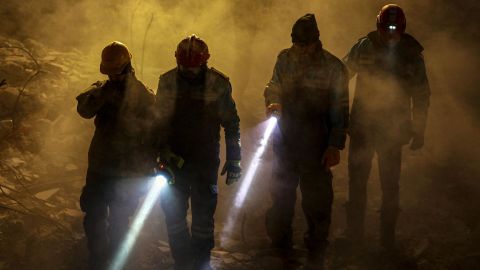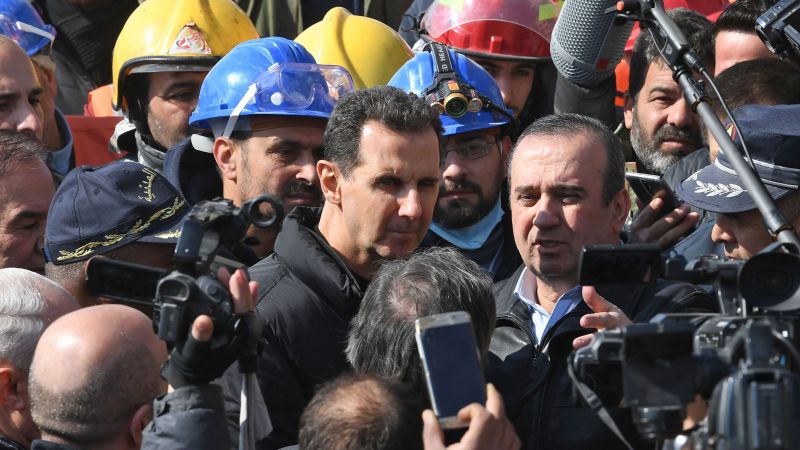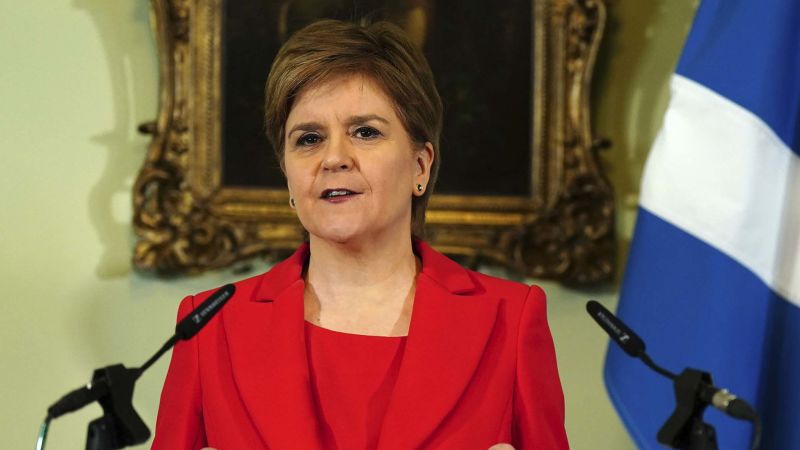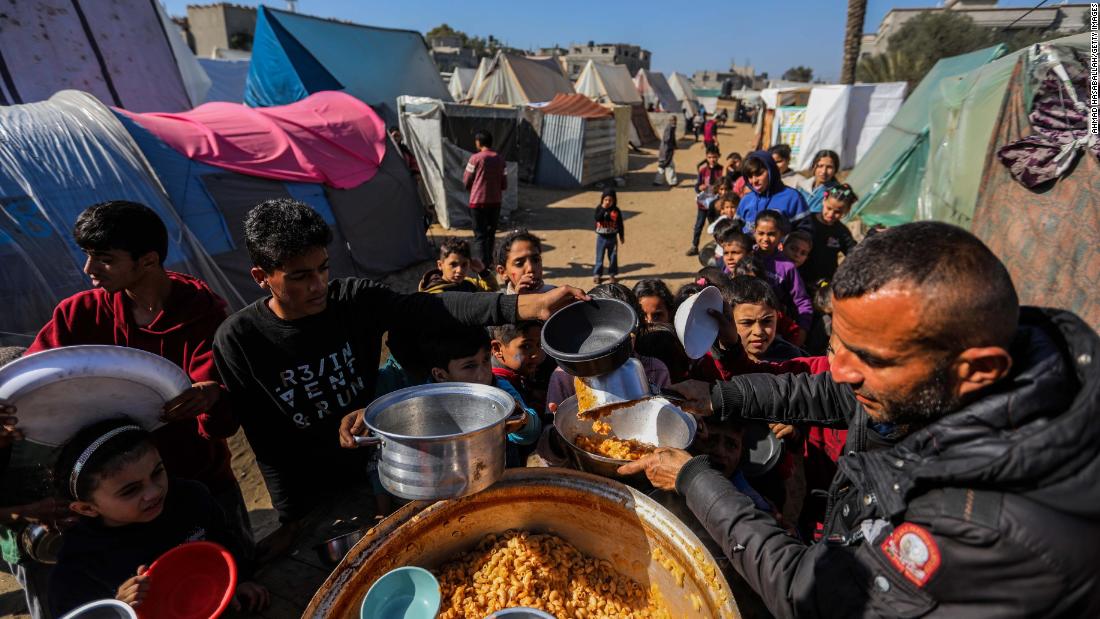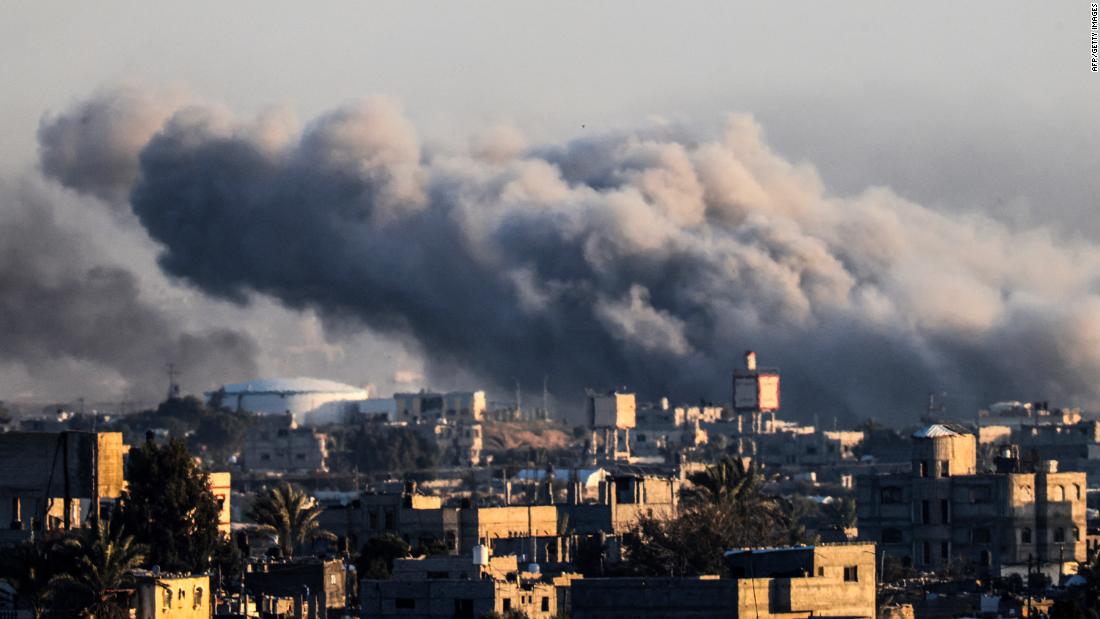Syria’s Assad hopes quake can help free him from global isolation

Editor’s Note: A version of this story appears in today’s Meanwhile in the Middle East newsletter, CNN’s three-times-a-week look inside the region’s biggest stories. Sign up here.
Abu Dhabi
CNN
—
Eight days after a devastating earthquake struck Turkey and Syria, a relief plane touched down in the Syrian city of Aleppo, marking one of the biggest diplomatic feats for the country’s isolated regime in over a decade.
The plane came from Saudi Arabia, one of the staunchest opponents of Syrian President Bashar al-Assad and his Iran-allied regime that has been accused of brutally suppressing an uprising th-t started in 2011.
It was the first Saudi plane to land at a regime airport in more than a decade, and it was aired prominently on both countries’ state-backed media.
Not long ago, such a move would have been inconceivable. In 2016, a bombardment campaign by Assad and his ally Russia battered Aleppo in an effort to take back the city from opposition forces – who at the time were supported by Riyadh.
After years of Syrian infighting, Assad – with Moscow’s help – regained control of most of the country, with the exception of a northern strip still controlled by a number of opposition forces, some of which are backed by Turkey or the United States. The quake impacted areas within the regime’s control as well as those held by the rebels, which relief workers have had difficulty accessing.
The quake has so far killed more than 41,000 in both Syria and Turkey.
Since the quake struck, the Syrian government has mobilized its officials and diplomats to make the argument that Western sanctions against it are hindering the aid effort, but activists and sanctioning states aren’t buying that.
Syrian activists have warned that the Assad government is exploiting the earthquake to rehabilitate itself by calling on international donors to direct aid through Damascus, its capital, and remove the sanctions. Assad, they say, stands to benefit from the earthquake.
“The earthquake gave the regime an advantage to survive politically,” said Omar Alshogre, a Washington, DC-based Syrian activist who says he was detained and tortured by Assad’s regime. “Because the Syrian regime will use the earthquake to normalize itself.”
Assad was sidelined internationally after a 2011 uprising morphed into a bloody civil war between the regime and opposition forces, backed by foreign actors, who wanted to see him go.
Saudi Arabia has been one of the last major hurdles to regional normalization with Assad, whose regime was suspended by the Arab League in November 2011. But rumors have been circulating of late that Syria is close to being re-admitted, pending a no-objection from Saudi Arabia and Qatar, which is yet to reach out to Assad.
During a meeting with European Union foreign policy chief Josep Borrell this week, Saudi Foreign Minister Prince Faisal Bin Farhan emphasized the need to deliver aid “to all parts of Syria,” adding that “we must ensure that the huge humanitarian burden on the Syrian people is lifted.”
Riyadh isn’t the only foreign actor to coordinate with Assad’s regime following the quake. The president has received a number of calls and visits from foreign leaders and diplomats. The United Nations and the EU have also heeded the Syrian demand for cooperation with the regime if they wish to deliver aid to victims in the country.
Among the harshest measures against the Syrian regime is the US’ 2019 Caesar Act, which imposed wide-ranging sanctions to restrict individuals, companies or governments from economic activities that assist Assad’s war effort. The act rendered the entire economy untouchable.
Some Western officials and analysts deny that sanctions are affecting aid deliveries. Still, the US Treasury last week issued a 180-day sanctions waiver on transactions related to earthquake relief.
Charles Lister, senior fellow at the Middle East Institute in Washington, DC, said that “there is no correlation between sanctions by the US and other like-minded partners around the world and the delivery of humanitarian aid.”
“The real obstacles are political,” he told CNN’s Boris Sanchez, adding that the regime has constrained cross-border aid by placing a great deal of pressure on the UN to coordinate with Assad.
Alshogre, the Syrian activist, bemoans the UN’s decision to coordinate with Assad despite the regime’s human rights record, noting that Assad has in the past withheld aid to punish rebels.
But not everyone agrees that coordination will necessarily lead to the regime’s rehabilitation.
Justine Walker, global head of sanctions, compliance and risk at the Association of Certified Anti-Money Laundering Specialists (ACAMS), said difficult discussions will have to be had with the regime if aid is to reach all impacted areas of Syria. “You cannot deliver humanitarian aid in a vacuum without that,” she told CNN.
Walker, who worked on Syrian sanctions for years, stressed the importance of seeing the complexity that comes with sanctions, especially in the context of urgent humanitarian aid.
While sanctions are not the direct cause of slowed humanitarian relief in quake-stricken northwest Syria, they have created a restricted environment that makes it harder to send money, equipment and other forms of relief compared to a non-sanctioned country, she said.
From purchasing jet fuel in the sanctioned country to the overall risk appetite sanctions instill in various international actors, sanctions will ultimately complicate international aid in a situation like that of Syria, she said.
“It really is as complex as it gets around humanitarian response and sanctions,” she told CNN.
The Syrian government didn’t respond to CNN’s request for comment.
Many are skeptical that Assad will deliver aid to his adversaries in regions he once bombed.
The regime has maintained a “siege and starve” strategy over its opponents throughout the country, said Lister.
“So if that aid goes through Damascus, there is an extraordinarily slim chance of any of it ever going into opposition-held areas of the country,” he said, adding that as recently as last year, Assad stifled the flow of humanitarian aid from regime-held to opposition-held areas.
Additional reporting by Mostafa Salem and Celine Alkhaldi
- A 77-year-old woman was rescued from debris in the Turkish city of Adiyaman on Tuesday, some 212 hours after the quake.
- Eleven trucks with UN aid crossed into northwest Syria via the rebel-held Bab Al-Salam passage on Tuesday, UN aid chief Martin Griffiths tweeted, adding that 26 more trucks passed into the region via the Bab Al-Hawa crossing.
- A verdant olive grove was cleaved into two during last week’s devastating earthquake in Turkey, creating a valley 984 feet long (about 300 meters) that now divides the area.
- Turkish-owned chocolatier Godiva is providing support to those impacted by the earthquake, CEO Nurtaç Afridi told CNN on Tuesday.
- The UN’s children’s organization UNICEF on Tuesday said that even without verified figures, it is clear that the number of children killed will continue to grow.
- Turkish President Recep Tayyip Erdogan said more than 13,000 people are still hospitalized.
China calls for early resolution of Iran nuclear issue
China’s President Xi Jinping on Tuesday called for the early and proper resolution of the Iran nuclear issue while expressing his support for the Islamic Republic in safeguarding its rights and interests, Reuters reported, citing Chinese state media. “No matter how the international and regional situation changes, China will unwaveringly develop friendly cooperation with Iran and promote the continuous development of the China-Iran comprehensive strategic partnership,” Xi said.
- Background: A 2015 nuclear agreement limited Iran’s uranium enrichment program to make it harder for Tehran to develop nuclear arms, in return for lifting international sanctions. But in 2018 then-US President Donald Trump ditched the deal and reimposed sanctions. China has criticized Washington for withdrawing from the deal and insists that the US should make the first move in reviving the pact.
- Why it matters: China and Iran, both at odds with the West, have been growing closer of late. Last year, they began the implementation phase of a 25-year cooperation accord under which China is to invest billions of dollars in Iran’s petroleum sector in exchange for the supply of oil and petrochemical products. China is already Iran’s biggest trading partner.
UAE’s COP28 president-designate says world needs climate ‘course correction’
The UAE climate envoy and designated president of the COP28 climate summit said Tuesday that the world needed a “course correction” to limit global warming and that he would lay out an inclusive and innovative roadmap, Reuters reported. “The world is playing catch-up when it comes to holding global temperatures down to 1.5 degrees and the hard reality is that global emissions must fall 43% by 2030,” he said, referring to the goal of capping global warming at 1.5 degrees Celsius.
- Background: The UAE has, alongside other Gulf energy producers, called for a more realistic transition in which fossil fuels would keep a role in energy security while making commitments to decarbonization. Jaber said policies should support growth and help battle climate change at the same time with capital as key.
- Why it matters: The UAE is a major OPEC oil exporter. Jaber also heads the state oil giant ADNOC and his appointment to lead the climate summit this year fueled activists’ worries that big industry was hijacking the world’s response to the global warming crisis. But he said on Tuesday his presidency would bring a fresh approach to tackle climate change challenges. “As COP28 president, I will lay out a roadmap for COP28 that is inclusive, results-oriented and far from business as usual,” he said.
US says ‘deeply troubled’ by Israeli government approval of West Bank settlements
The US is “deeply troubled by Israel’s decision yesterday to advance reportedly nearly 10,000 settlement units and to begin a process to retroactively legalize nine outposts in the West Bank that were previously illegal under Israeli law,” US Secretary of State Antony Blinken said Monday. “We strongly oppose such unilateral measures, which exacerbate tensions and undermine the prospects for a negotiated two-state solution,” Blinken said in a statement.
- Background: Israel’s security cabinet Sunday gave official approval to nine Jewish settlements in the occupied West Bank, saying the move was in response to terror attacks in Jerusalem. The settlements already exist – some of them for decades, the government said in its announcement – but have not previously had official approval. Israel distinguishes between settlements which are authorized by the government and those which are set up unofficially, which it calls outposts.
- Why it matters: All Israeli settlements in the West Bank are considered illegal under international law because they are on land which Israel captured from Jordan in 1967; Israel disputes that interpretation of international law, saying the land is historically Jewish. The government of Benjamin Netanyahu relies on two Jewish nationalist parties led by settlers that have been pushing for the authorization and expansion of settlements.
Saudi Arabia: #World_Love_Day
Love was in the air in Saudi Arabia on Tuesday. Red roses, pink balloons, giant teddy bears and heart-shaped chocolates filled the streets of the kingdom’s shops and restaurants to celebrate the once-banned Valentine’s Day.
Hashtags marking the day were trending in the country.
“On this beautiful day and every day, practice the duty of love and declare it in front of everyone,” tweeted Saudi writer Waleed Dhafeeri to his one million followers. “Do not pay attention to the complicated people who practice their hatred against others, sometimes in the name of religion and sometimes in the name of tradition.”
The holiday was banned in the kingdom under a decree from the Saudi Committee of Promotion of Virtue and Prevention of Vice, often referred to as “religious police,” whose powers have been significantly curtailed since 2016.
The religious police had previously banned shops from selling roses and red items on this day as it was deemed un-Islamic.
Globally a multibillion-dollar industry, Valentine’s Day has been embraced in Saudi Arabia as the country embarks on a dramatic social transformation. While there was no formal revocation of the ban, police no longer confiscate items or patrol the markets anymore.
In the past few years, the kingdom has shifted its stance on music festivals, tourist attractions and lavish resorts, in a bid to attract tourists and rival Dubai as a luxury destination. This is part of Crown Prince Mohammed bin Salman’s plan to diversify the economy away from oil, which has seen decades-old rules relaxed.
Rights organizations say the social reforms are necessary but are also an attempt to rehabilitate the crown prince’s image.
Human Rights Watch has accused the kingdom of spending billions of dollars “hosting major entertainment, cultural, and sporting events as a deliberate strategy to deflect from the country’s image as a pervasive human rights violator.”
Saudi-owned English language news outlets Arab News and Al Arabiya English marked Valentine’s Day with special coverage. Arab News even changed its Instagram display picture to a heart. Arabic language news outlets however were conspicuously silent on the holiday.
By Dalya Al Masri
